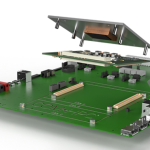An international research collaboration aims to find new ways of monitoring crop growth with biodegradable sensors that can be composted at their end of life.
The £1.8m project, called “Transient Electronics for Sustainable ICT in DigitaL Agriculture”, is led by researchers from the University of Glasgow and supported by teams in Canada, Finland, Poland and Switzerland. Over the next three years, the partners will work together to develop a new type of environmentally-friendly modular sensor system and create devices built from sustainable and degradable materials to tackle the growing problem of electronic waste.
“The proliferation of digital devices that underpin the Internet of Things will lead to a massive expansion in digital waste – as much as 80% of our electronic devices currently end up as waste. As potentially dangerous materials in components like batteries and printed circuit boards degrade, they create hazards to the environment and human and animal health, which can last for decades,” said Professor Ravinder Dahiya of the University of Glasgow’s James Watt School of Engineering, the project’s coordinator.
The new devices will have two parts: a solar-powered patch that can be applied to the surface of the leaves of crops to measure key indicators of their growth, and an electronic module that will wirelessly transmit that information to a central computer. The patch will be completely biodegradable, capable of nourishing the soil once it reaches the end of its useful period. To do so, the scientists will investigate how compostable electronic components might be made from everyday materials like rice husks or wool, or biodegradable polymers like starch or cellulose, combined with conductive metal nanoparticles made from materials like copper and zinc. They will also explore how the compostable components can be powered by similarly biodegradable organic photovoltaic materials, to support the patch’s tasks of monitoring pH, temperature and bioimpedance, with energy stored in a biodegradable supercapacitor. Supercapacitors provide a sustainable, non-toxic alternative for conventional batteries.
The electronic module will be equipped with wireless communication technology, but it will be reusable and repairable to further minimise waste.
“Out undertaking to build hardware designed to be disposable without creating problematic waste is an ambitious one, but it brings together some of the leading experts in the field of sensor and material development from across Europe and North America. I’m confident that we can create prototypes with the potential to make real change and take us closer to achieving a zero-waste world.”
The research is funded by URKI in the UK, FRQNT in Canada, Academy of Finland in Finland, NCN in Poland and SNSF in Switzerland.










